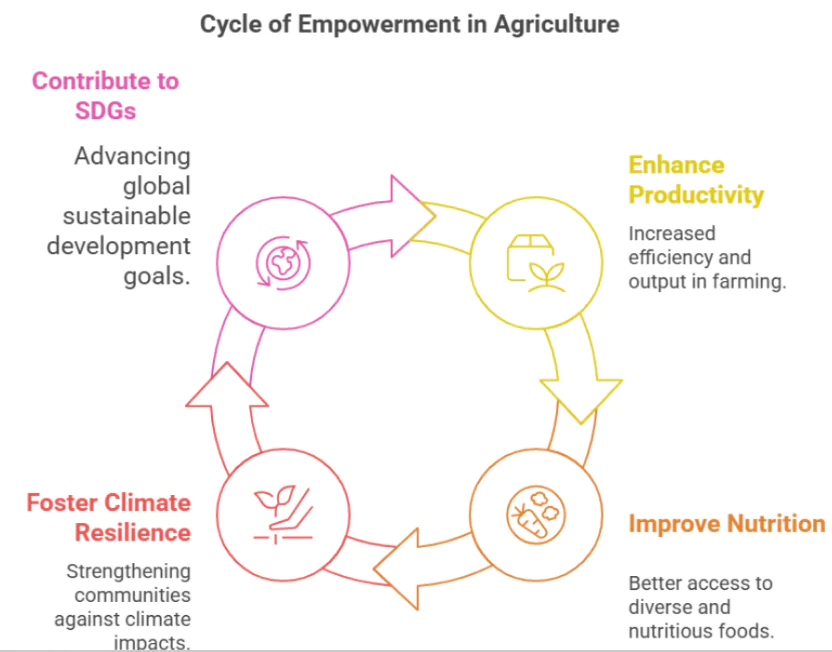The United Nations General Assembly has declared 2026 as the International Year of the Woman Farmer.
- The initiative recognizes the essential role of women in agriculture and food security, while addressing gender disparities in land ownership, market access, credit, and technology.
Key Highlights: Women’s Role in Agriculture
- Women contribute to nearly 50% of the global food supply.
- In developing countries, women produce 60–80% of food.
 In South Asia, they constitute 39% of agricultural labour.
In South Asia, they constitute 39% of agricultural labour.- In India, ~80% of economically active women work in agriculture, but only 8.3% own farm land and 14% land ownership (as per latest National Family Health Survey).
- As per PLFS 2023-24, Over three-quarter (76.95%) of rural women are now engaged in agriculture, indicating a significant rise in their role as cultivators and laborers.
Challenges faced by women farmer
- Double Burden of Work: Women often juggle unpaid domestic responsibilities alongside agricultural work.
- This limits their time, productivity, and participation in decision-making processes.
- Low land ownership: Restricts access to credit, technology, and government schemes.
- Limited access to agri-advisories: Due to digital divide (mobile/internet usage).
- 51% rural women aged 15+ don’t own a mobile phone ( NSO).
- Climate Vulnerability: Increases women’s domestic and agricultural burdens.
- For example: In Vidarbha, Maharashtra, widows of farmers who committed suicide struggle with debt repayment and legal land ownership issues.
- Inadequate financing: Microfinance helps but often insufficient for capital investment.
Government Interventions for women farmers
- Mahila Kisan Sashaktikaran Pariyojana
- Aims to Skill-building and access to resources for women farmers.
- Sub-Mission on Agricultural Mechanisation
- Provides 50–80% subsidies on machinery.
- National Food Security Mission (NFSM)
- 30% of funds earmarked for women in certain States/UTs.
Case Study: ENACT Project (Assam)
- The ENACT project primarily connects women farmers with experts through information technology, providing actionable agricultural and climate advisories weekly via their phones.
- ENACT = Enhancing Climate Adaptation through Nature-based Solutions & Gender Transformative Approaches.
- Run by World Food Programme + Govt. of Assam, funded by Norway
- Focus:
- Promote climate-resilient varieties (e.g., flood-resistant rice)
- Weekly climate advisories via mobile phones
- Smart seed production systems run by women
- Use of Climate Adaptation Information Centres
- Institutional collaboration with State depts & agri universities
Other notable examples: The Jeevika programme in Bihar. |
Way forward: Policy Recommendations
- Gender-sensitive Policy Design
- Collect granular, sex-disaggregated data for targeted interventions to women’s specific challenges.
- For example: The Pradhan Mantri Krishi Sinchayee Yojana has introduced special provisions for female farmers to access irrigation schemes.
- Access to Resources
- Improve access to land, credit, digital tech, weather info services, etc.
- According to the United Nations Food and Agriculture Organization (FAO), farm output in developing countries can be raised by 2.5 to 4% by ensuring men and women equal access to resources, skill development, and opportunities in agriculture.
- Women-led Agri-Value Chains
- Support women’s SHGs, collective action & value-chain participation.
- Capacity Building & Behaviour Change
- Ensure participation in planning, technology dissemination, decision-making.
- Shifting Societal Perceptions of Female Farmers: Recognizing women as equal contributors in agriculture can challenge gender biases and improve their social status.
- For example: The “Kisan Sakhi” initiative in Maharashtra promotes women-led farmer groups, giving them market visibility and leadership roles.
Conclusion
The declaration of 2026 as the International Year of the Woman Farmer presents a historic opportunity to advance resilient agricultural development and gender equality.
- By recognising, empowering, and investing in women farmers, we can strengthen food security, drive inclusive economic growth, and promote sustainable, climate-resilient farming systems.
Additional Reading: Feminisation of Agriculture Empower Women
![]() 10 Jun 2025
10 Jun 2025

 In South Asia, they constitute 39% of agricultural labour.
In South Asia, they constitute 39% of agricultural labour.